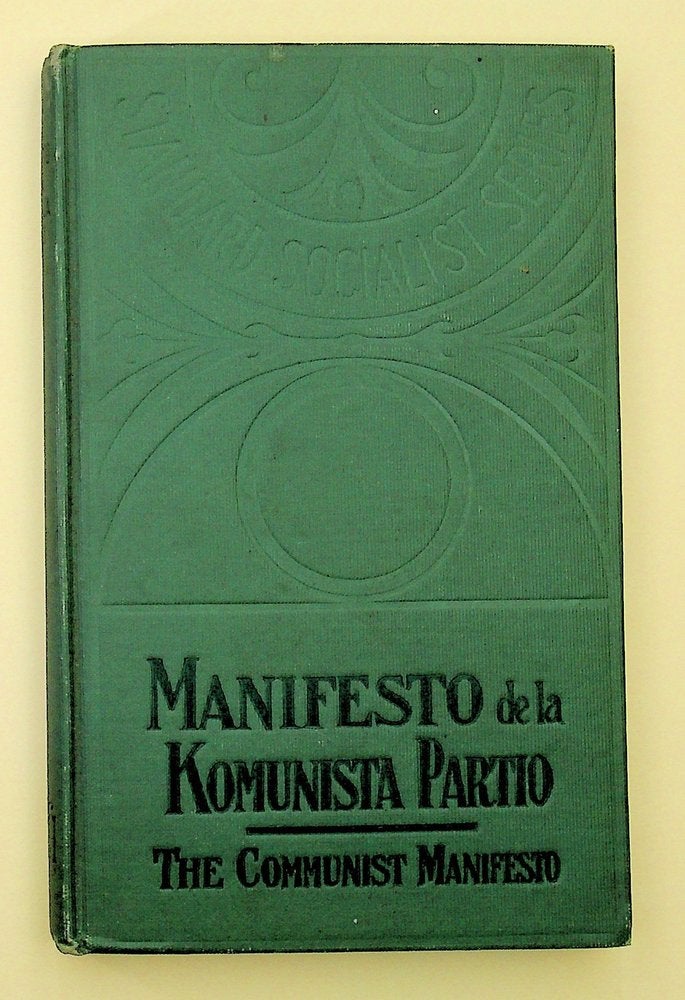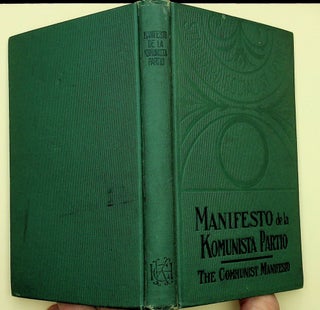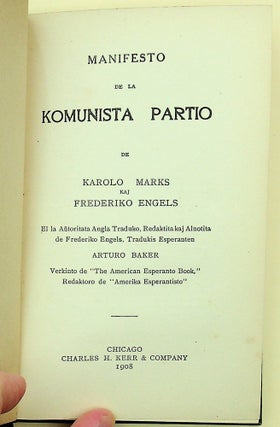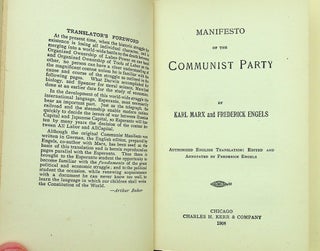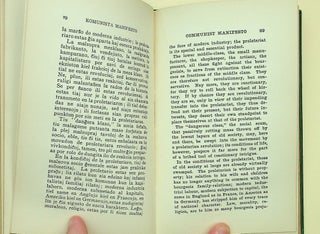Manifesto de la Komunista Partio ... El la Autoritata Angla Traduko, Redaktita kaj Alnotita de Frederico Engles, Tradukis Esperanten / Manifesto of the Communist Party ... Authorized English Translation : Edited and Annotated by Frederick Engles
Chicago: Charles H. Kerr & Company 1908. first Esperanto edition. [2], [120] pages. 12mo. 6 3/4 x 4 1/4 inches. Publisher's original green cloth with spine titles in dark green. Front board with blind stamped decorations at top noting this is a part of the Standard Socialist Series and titles below that in dark green embossed stamping. Some minor soiling, a few dings to the binding. A bright clean copy noting the previous owner's address label on the front pastedown endpaper.
Pagination and contents are arranged to encourage use and study. The first leaf recto is the title page in Esperanto, with the Esperanto translator Baker's preface on verso. Second leaf recto is the English language title page, with the beginning of the English text on verso. Opposite that (third leaf recto) is the same page in Esperanto. This same arrangement (left page in English, right page in Esperanto) continues throughout (within the limitations of the translations fitting onto the opposite page) the idea being the student of Esperanto could look left and right to compare texts in the different languages. The last page in English is page 64. Pages 64/5 (the leaf opposite) concludes the Esperanto translation. Some paginations record this as [2], 2-62, 3-65 pages. The volume is complete as published. Very Good. Cloth. [28776]
"At the present time, when the historic struggle for existence is losing all individual character, and is merging into a world-wide battle to the death between Organized Ownership of Labor-Power on one hand and Organized Ownership of Tools of Labor on the other, no person can have a clear understanding of the magnificent contest unless he is familiar with the cause and course of the struggle as outlined in the following pages. What Darwin accomplished for biology, and Spencer for moral science, Marx had done at an earlier date for the study of economics.
In the development of this world-side struggle the international language, Esperanto, must necessarily bear an important part. Just as the telegraph, the railroad and the steamship enable modern nations quickly to decide the issues of war between Russian Capital and Japanese Capital, so Esperanto will hasten by many years the decision of the contest between All Labor and AllCapital (sic).
Although the original Communist manifesto was written in German, the English edition, prepared by Engels, co-author with Marx, has been used as the basis of this translation and is herein reproduced on pages parallel with the Esperanto. Thus there is brought to the Esperanto student the opportunity to become familiar with the fundamentals of the great political and economic struggle; and to the political student the occasion, while renewing acquaintance with a document he can never know too well, to learn the language in which our children shall write the Constitution of the World. - Arthur Baker" (translator's preface).
Uncommon. An important work, a first in a new language. A prize for those interested either in Esperanto or the Manifesto.
ITEM SOLD


